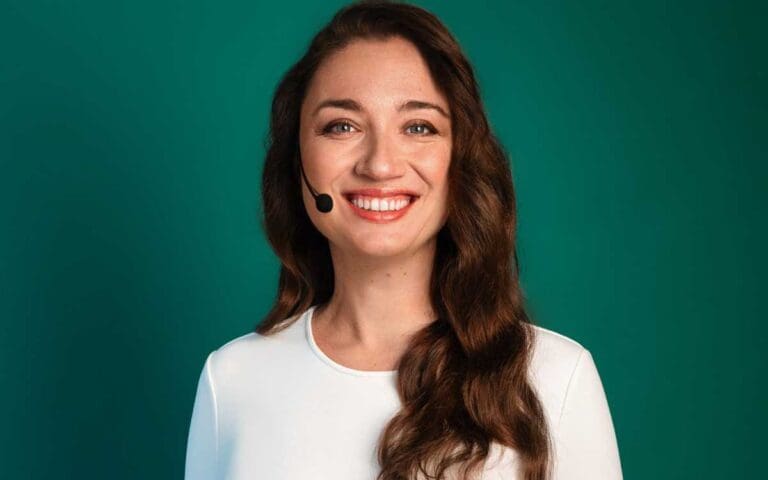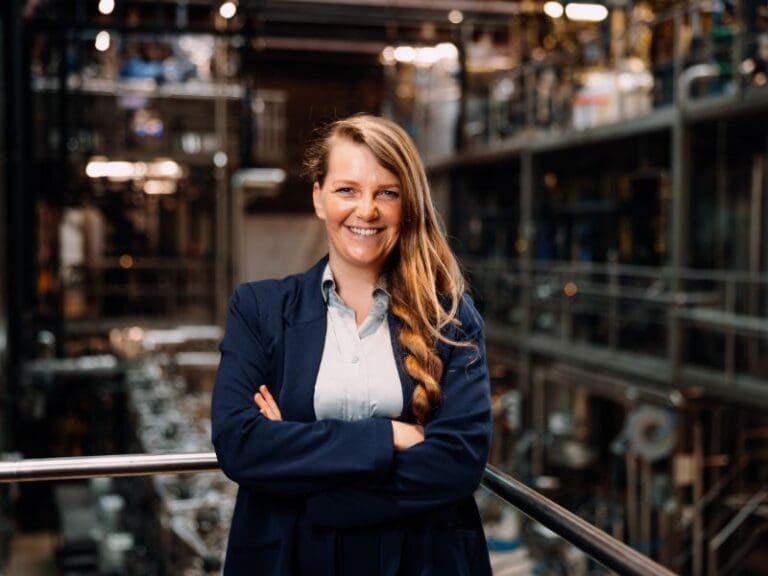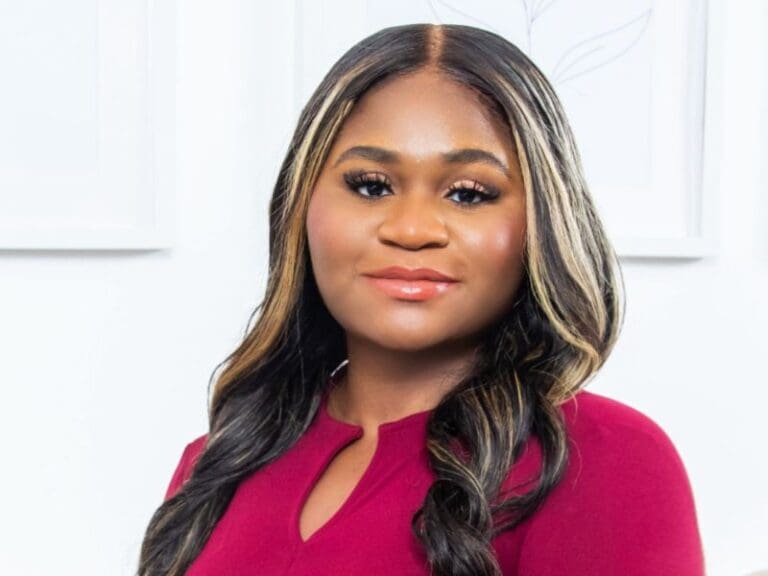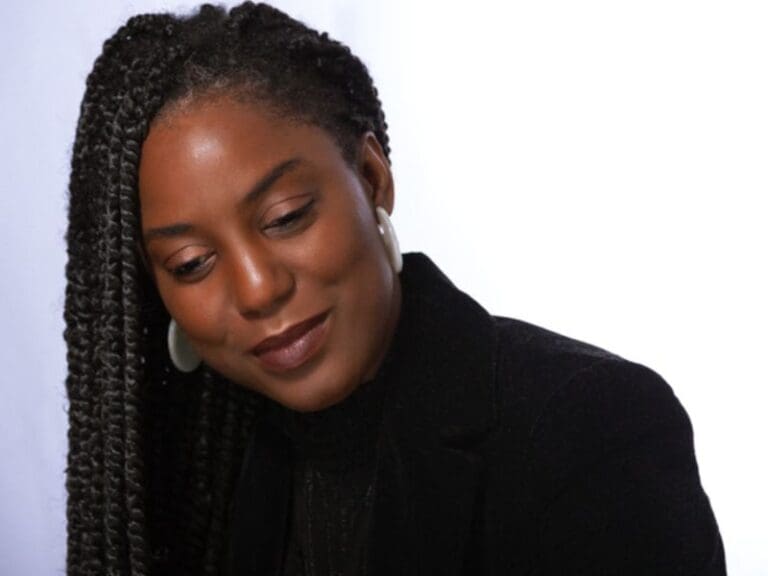Dr Anastasia Dedyukhina is a TEDx and keynote speaker, author, and founder of the digital wellbeing consultancy and training network Consciously Digital.
Consciously Digital helps individuals and organisations develop a more balanced approach to their relationship with technology.
How did you land your current role? Was it planned?
If anyone told me ten years ago that by 2024 I would be doing what I do now, I would never ever believe them. I run a global network of 130+ digital wellbeing coaches, direct and teach the first certification program in digital wellbeing accredited by two major coaching associations, speak at global conferences, mentor ethical start-ups and work with leaders on the future of work. It all emerged from a personal challenge.
Ten years ago, I was working in a corporate setting, largely in localisation of large tech products as a country manager. My last position was a client director for a marketing agency in London on a big tech brand, convincing people to click more on the ads, and feeling like I was totally failing to balance my own tech usage. I checked emails in the middle of the night and slept with my phone – not because I needed to, but because everyone around did it too. I was completely overwhelmed, and when my contract came to an end, I decided to take a break and get rid of my smartphone for a few months to create some thinking space. Little did I know that this personal “detox” would last 1.5 years and result in me becoming one of the leaders of the global digital wellbeing movement.
I was qualifying as a coach at the time, and people started asking me if I coached others on how to get rid of phones. I thought – okay, so I’m not the only one who has this problem, maybe there’s a niche here. I started reading all the available research at the time and interviewing experts, and started writing my first book (which took a few years and I eventually had to self-publish and crowdfund for, as nobody knew me). To raise awareness about the subject, I started speaking about the topic at small meetups, then did my first paid speaking gig. It grew from there and my first TEDx talk about life without a smartphone went viral generating 400,000 views organically. And all of a sudden the whole field exploded, I started getting calls from journalists, conference organisers etc.
I wasn’t trying to convince anyone about getting rid of tech, but rather reflecting on how to find the online/offline balance and talking about the importance of ethics in tech design. When after the scandal with Cambridge Analytica the whole field of digital wellbeing just exploded, I was already well positioned and ended up getting too much work so needed to refer it to someone, but couldn’t find any experts – that’s how the certification appeared, and then the alumni went into the network.

What are the key roles in your field of work, and why did you choose your current expertise?
The exciting thing about digital wellbeing is that this is still an emerging field, and you can easily create your own role within it. Our graduates typically take several career paths – from starting their own coaching and consulting business (most often for companies or families) to bringing digital wellbeing to their workplace, from organising digital detox tours to changing their jobs in UX/Product and becoming advocates of ethical tech usage, to going deep into research about the impact of devices on humans.
Given the AI boom and all the discussions about whether we should merge with AI, I would very much encourage you to look at getting into the digital wellbeing now, as it will help solve tremendously impactful problems in the coming 5-10 years.
Did you (or do you) have a role model in tech or business in general?
There were bits and pieces that I took from different people. For example, I didn’t know at the time what coaching was but I loved to watch the shows of Marie Forleo. She made me feel very enthusiastic and I thought – wow, if I could do work like this, when I’m just talking about subjects that I like and get paid for it, this would be fantastic. Subjects that like includes technology, and I’m very lucky that this happened. But her and other public figures were more of an inspiration, I don’t think this alone made a big difference.
What definitely has been helpful is working with different helping professionals – coaches, consultants, real experts – throughout my adult life. I am a big believer of investing in your own development, and I am absolutely convinced that I wouldn’t be where I am right now if I didn’t work with all those people (or rather, it would have taken me much, much longer and I’d miss plenty of opportunities). At each point of my life, before I made a qualitative jump, I invested heavily in working with the best people I could afford at the time (and every time it seemed like crazy money, but eventually it was worth it, or I found a way to make it work).
Another supporting factor was the community – hanging out and speaking to optimistic and professionally successful people made huge difference. I am very grateful to my cohort of coaches with graduated together from, who actually pushed me heavily to start doing what I was doing, and some of them donating very generously their time and expertise to speak to me.
What are you most proud of in your career, so far?
Creating whatever I’ve done with zero marketing and financial resources, just by myself. My book Homo Distractus sold over 10,000 copies without any marketing or PR support, although all publishers and agents I spoke to told me it won’t be interesting, nobody knows me etc. I’m proud of having built the network of like-minded people. Proud of having impacted thousands of people through my talks around the world – this is actually the best part, I still keep receiving notes from people who have been at my lectures 5-7 years ago. One participant wrote to me a couple of days ago on LinkedIn saying: “Dr. Anastasia Dedyukhina, forever grateful for your talk on this several years ago in Manchester, which taught me so much about the importance of being conscious in our relationship with technology.”
For me it’s the very best reward I can get as a speaker and teacher.
What does an average workday look like for you?
I am a reasonably early riser, and typically wake up with sunrise (which is also a pretty annoying quality if you get to bed late, so I try not to get to bed too late). I take time to do my morning routine (shower, stretching, a bit of sunlight – I’m lucky to live outside of the city in a house with a garden, breakfast) and whatever needs to be done house/family-wise, and then I’d either go into work mode (I work from home), or if I had a late night working and feel exhausted, first I will go on an 1-hour walk.
I try not to use technology before breakfast to allow myself to reconnect with my sensations and what I feel needs to be done today work-wise. I keep my phone in the other room not to feel tempted to check it first thing in the morning. When I feel the temptation to stay in bed and spend time just mindlessly scrolling, I know that I have exhausted myself, and I need some recovery time. So work is being pushed for later, and I’ll either start cleaning the house (it calms me down) or go outside into nature. For me, it’s crucial to be by myself during this time and not have any technology (news, podcasts) interfering with it.
In terms of work, I’d normally work on the projects requiring full attention mode from around 10 a.m. to lunchtime, then my attention starts naturally dropping. So I take a good break for a couple of hours, maybe even a quick nap, then continue into the evening with tasks that require less attention – meetings, admin etc. In the evening, there’s typically physical activity with a group (dancing always and something else, currently pilates) and I try to make space for social life (friends, inspiring meetups) at least a couple of times per week, too. I teach twice a week in the evenings, so on those days walks and sports will happen in the morning. Weekends I try to avoid working and spend longer time outdoors.
As you might have noticed, I very much try to balance the physical, emotional, intellectual, fun, social and natural parts of life, and I am making a very big point about it. Overall, I’d say I probably work around 6 hours per day. Of course, there are times when I need to do more, but knowing myself well enough, I try not to do it as this taps into my future energy reserves and requires more time for recovery.
Are there any specific skills or traits that you notice companies look for when you’re searching for roles in your field?
I think that an ability to stay focused, be resilient and manage one’s own stress in the digital age is a crucial skill that everyone needs to develop these days, especially if you work in such a fast-paced environment as the tech sector, where everything is changing so rapidly. A recent McKinsey report about the future of work identifies top 56 skills people will need to thrive, and lots of them are related to self-management, problem-solving, clear communication – in short, all those skills that you cannot develop without being fully present. And we are all so distracted these days, so overwhelmed with digital noise, that I think pretty much everyone is lacking this deep attention, and we all have to work hard on restoring it.
Has anyone ever tried to stop you from learning and developing in your professional life, or have you found the tech sector supportive?
I don’t honestly remember, although I’m sure there were people who have their opinion about what I should and shouldn’t do and perhaps shared it with me. Well, my mom still hopes I’ll become a classic opera singer one day. 😊 But everyone is entitled to their opinion, aren’t they? It doesn’t mean that you have to listen to it (although I do take sometimes singing classes for the pure joy of it 😊).
Have you ever faced insecurities and anxieties during your career, and how did you overcome them?
Oh, all the time. I am probably one of the most insecure people I’ve ever known, although I know I don’t come across as such. What helped me is just to understand that whatever I’m doing is bigger than me. For example, I used to work in the environment where people sat in the same room and spoke to each other via a computer chat, and hardly took any breaks. I felt so miserable in it that I really wanted to speak up about it and say to all those living through this now that it’s not normal, and if you feel horrible in such an environment, it’s not because something is wrong with you, but because the whole structure is dead wrong. And however awkward you may find it to say it, if it’s a truth, it finds its way to people’s hearts.
Entering the world of work can be daunting. Do you have any words of advice for anyone feeling overwhelmed?
Forget everything you’ve been told on how to get into the world of work. These rules have been created in different times and don’t apply. Now everything is changing so rapidly that all you need to do is to stay open for the opportunities. No matter how old you are, my recommendation would be to get curious and try out different things – do a few internships (even if for free), try to do your own thing, go to meetups and conferences and speak, speak, speak to people who really achieved something. Curiosity and relationship-building will get you a long way. (And if you are worried about paying your bills meanwhile, find a very basic part-time source of income that doesn’t eat up your liveliness – for example, when I was just building my business, I was doing a bit of property management and small-scale rentals on the side).
My other recommendation would be to learn a specific skill and start getting into contract jobs with it – easier to get, better money, and after a few of those you’d be easier to employ.
What advice would you give other women wanting to reach their career goals in technology?
Many times women don’t go into tech because they think they don’t have a technical background. But today tech is so omnipresent and gets incorporated into so many areas of our lives that a technical background isn’t needed (and in fact, I would argue, is sometimes even getting in the way, as in my opinion the tech sector these days needs an alternative view). I am a very big advocate of getting more women in tech via the path of digital wellbeing and tech ethics – because women are naturally more drawn to the questions of sustainability, wellbeing and balance, because they push for the need of these things. I think our tech right now is very one-sided, very much oriented towards efficiency and making humans behave like machines, and I am a big believer that women who are in line with themselves, with natural rhythms, who tend to think more also about the future generations and about the impact we have on the Earth, can bring a new much-needed perspective to tech development.







